|
|
The Moldova "Quasi-"Blog II: The Adventure Continues... |
|
![]()
| Links to all of my on-line ramblings and other useful information. | My preparations to come to Moldova and my first impressions of it | More on Moldovan Economics, social realities, transportation | More on Communist architecture, Martisurs, and Int. Women's Day | Spring finally comes to Chisinau and I am making trips around the country. | The end of the semester and exams at the university. |
|
Adventures of Dr. Chris Grant of Mercer University and 2006 Fulbright Scholar |
![]()
 Academy of Economic Studies in Chisinau
Academy of Economic Studies in Chisinau
|
28 Feb...Lectia Doi in Economice...means
"second lesson in economics" in Romanian. This time I will treat you
to microeconomics! First, Moldova is a "cash" society. You pay
bills in person (either at the bank or the post office) in cash. For
most official bills you pay in the local currency but landlords want
either dollars or Euros (mine wants Euros). Moldovan currency (the
lei--pronounced LAY) cannot be taken out of the country. A new surcharge on ATM transactions is going to be implemented on March 1. The ultimate result of the new charge and the fact that I am cheap is that I have been trying to get my next two months rent (EUR 1000) in cash before the surcharge goes into effect. Of course, you can't get Euros out of the ATM, you get lei. So I have been stockpiling my lei in anticipation of paying the landlord--I actually had 16,000 lei at one point... unnerving. Today, I got a snazzy new haircut for 40 lei ($3.07) at the salon across the street. All this did get me to thinking a bit about the cost of living. I made a little chart on the right that breaks down some costs (as well as pics of the currency and an exchange rate board). All told, American professors are in a bit better off than Moldovan ones. Moldovan professors usually teach 8-10 classes per term for a base salary of $100. They also teach extra classes, tutor, or translate on the side for extra money. I hesitate to publish this page because the Deanly sorts back home might decide to replace all us American professors with Moldovans! My students are doing well and I am really enjoying teaching them. I showed my language students The Autobiography of Miss Jane Pittman yesterday and they did just fine with it. They are reading Everything That Rises Must Converge by Flannery O'Connor (thanks Jean Fallis) right now. My American Politics students are finishing the Constitution and all of them have their very own copy (thanks Mike Digby). Having any published material is a big deal here and to have given each a copy to keep was a special treat. Books are scarce and very expensive here. Professors generally give a copy of something to their students and then the students share or make copies. The weather is still cold but when I was at the lake today (walking on it) I noticed some cracks and thought, "I may not be able to do this again." Tomorrow is March 1st and I have been here nearly two months--I can hardly believe it! PS. I already paid the landlord his Euros, no use in flying over to rob me! |
|
||||
| Average Price Comparison (Monthly) | Chisinau | Macon | ||||
| Apartment Rent | $100 | $500 | ||||
| Buy a House | $45,000 | $100,000 | ||||
| Haircut | $3 | $12-15 | ||||
| Bus Ride | 6 cents | $1 | ||||
| McDonald's | $6 | $4 | ||||
| Electric Bill | $17 | $70 | ||||
| Professor's Salary | $100-150 | $3,500-5,000 | ||||
|
|
||||||
![]()
| 26 Feb...Sunt putin bolnav, acesta saptamina...that
means
"I have been a little sick this week" in Romanian (or Moldovan, depending on
what you call the official language of state here). Language is
tricky here for me because Moldovans speak several and I speak only one of
the main ones,
and then, only at the beginner level. Before I came to Moldova, I studied Romanian with Ada Marica, a Mercer student. She used dialogs that her mother wrote from scratch featuring a dimwitted and absent-minded professor named Negru. He was well-intentioned but was always forgetting things and making a fool of himself. His students had to come to his rescue, especially when came down with the flu but forgot to pick up his medicine. The dialogs were a really fun way to start learning the language. Now, I was always afraid that I might be as dimwitted as Professor Negru but thanks to the Romanian that I learned, I was able to merge (go to) la farmacia (the pharmacy) si sa cumper (and buy) medicamentale appropriat (the right medicines). A triumph indeed...except for one small issue I realized upon arriving home--the cough medicine instructions were in Russian! For me this was quite odd, but for a Moldovan, it is just a normal part of life. In fact shopping in the supermarket you will see not only Romanian and Russian labels but also French, Italian, German, English, Ukrainian, Bulgarian, and even English. Moldova is a small country with dispersed ethnic groups and products come from whatever supplier delivers them. Being sick this week, left me at home a good bit (I still made it to my classes and my Romanian lessons). I washed clothes (the Russian-speakers usually say cloth "Y" s--which I find really cute). Since watching TV in Romanian--forget Russian--gives me a headache, I use the TV to dry my clothes on (along with chairs and windowsills). I have taken to making my bed almost everyday (my Mom would be so proud). I keep Romanian vocabulary on the wall by my bed (this week colors and vegetables). For instance, carrots are called morcov in Romanian, blue is albastru, and the color purple is a REALLY GREAT MOVIE for which Steven Speilberg and Whoopi Goldberg were robbed at the Oscars. Speaking of movies (as if we were), I saw The 40 Year Old Virgin here last week (I did leave the apartment a couple of times). I would have thought it was a dumb and sappy movie at home but not having seen anything in English for over a month, I now think that it too deserves an Academy Award!!! Most movies here are American made and dubbed in Russian as Russian is generally understood in Moldova (especially in Chisinau). Speaking of no TV and not seeing many movies, what do I do here, you may ask. In addition to the excitement of laundry and making the bed, I have been teaching, visiting colleagues, writing papers, making presentations, and working to set-up an orphanage project. In my spare time, I read. Yes, me, I read (I always could, you know). I just finished a great biography of Ben Franklin and am reading one about George Washington. I am trying to understand if there is any such thing as an American identity as I try to figure out what it means to be a Moldovan. One person told me that to be Moldovan means knowing two languages. Another told me that Moldovans have to know many languages because the country is small and that only people that live in a big country can you have the luxury of expecting other people to learn your language. He is right--it is a luxury to expect others to learn your language but it is also a matter of respect. So I have been trying to learn Romanian (and hopefully even a little Russian). |
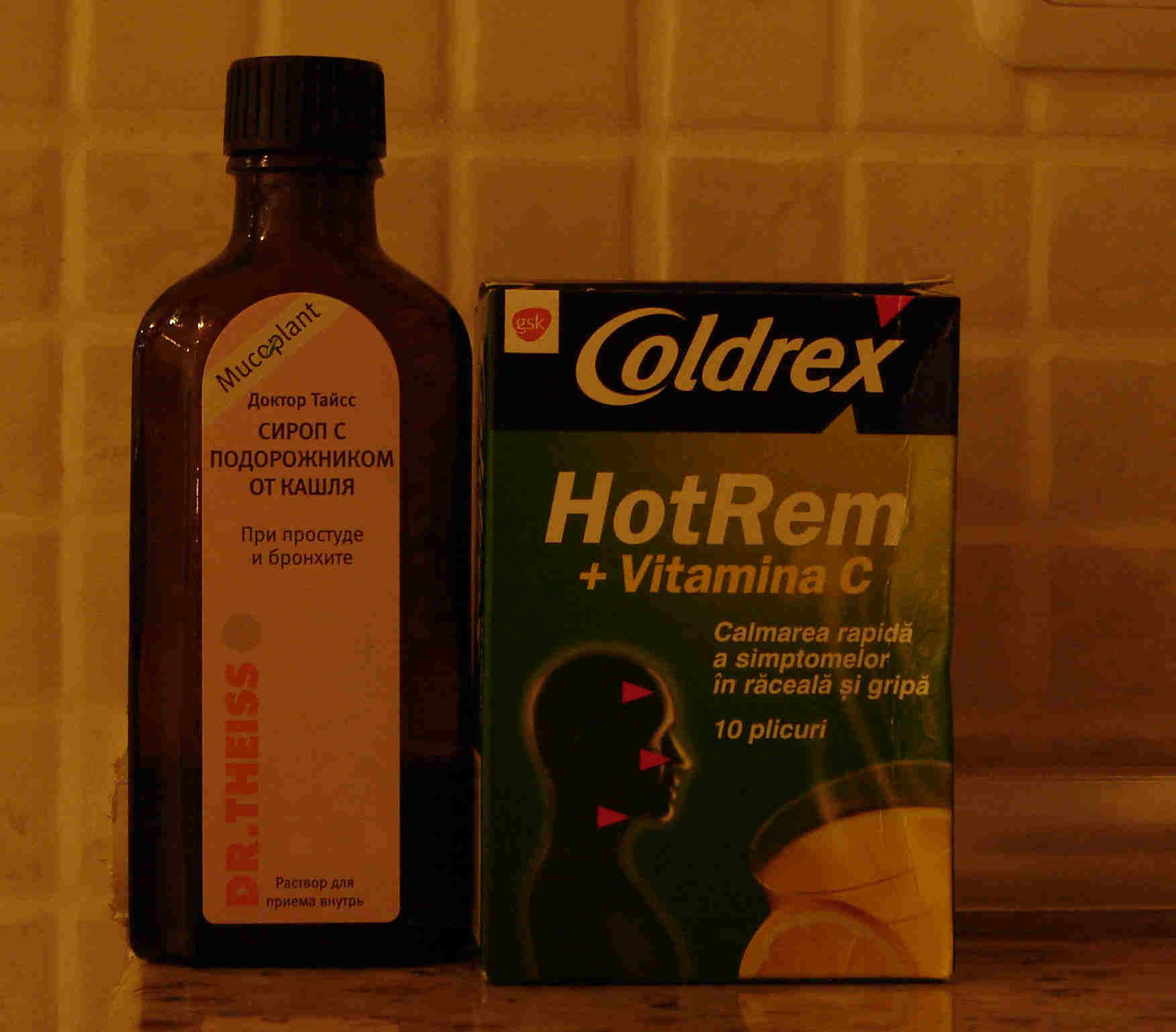 Medicamentale mea--my medicine in Russian and Romanian
Typical Moldovan apartment block with laundry drying outside...
1. I dry my laundry inside and since the TV gives me a headache--I found a new use for it... 2. Vocabulary on the wall and bed made...my ordinary life in Chisinau |
![]()
|
16 February 2006: frozen lake in Chisinau replete with ice fishermen and sportsmen. Hopefully, the Winter Wonderland is almost over! 16 February2006--Missing manhole cover--one of the few that I found! Irish comedian Tony Hawkes makes much light of the dangers of Moldovan pedestrian life in his book, "Playing the Moldovans at Tennis." At one time the removal of manhole covers was rampant in Chisinau (not so much anymore). In Howkes' book, he takes up a bet that he can beat the entire Moldovan national soccer team at tennis (this is the same guy that carried a refrigerator all over Ireland). He takes the bet, come the Chisinau, and begins his quest...its funny but not a terribly accurate account of my Moldovan experience. We were actually warned about them in our embassy safety briefing.
Source: Economist Intelligence Unit Data Service (thanks, Pete--I stole it from you)!
18 February 2006--Fulbrighters meet Peace Corps at El Paso Mexican Restaurant in Chisinau (from left to right: Tricia, me, Dan , Fern, Geoff, Josh, Malise, and Pete) |
20 Feb...Moldovan Economics 101...Some folks have
written having read or seen something about Moldova in the media and asked
me if it is really all that bad. First let me say: My living
experience in Moldova is not bad, quite the contrary, I am living
as well, if not better, than I do in Macon. Moldovans are lovely
people and I have been extended wonderful and warm hospitality (some
shopping experiences, aside). There are challenges to life here that
make it hard for Americans to fully understand the forces that affect life
here. I get bits and pieces of Moldova but the whole picture is
complex.
An example being that when I came here I expected to find that there were no manhole covers (Tony Hawkes would have you to believe that they are all stolen and melted for cash). This may have once been true but for the most part they have been replaced and sealed shut. If one is missing, there is usually a tree limb sticking out to warn pedestrians. The fact that there are few missing probably speaks to some improvement in the economic circumstances of Moldova (or more savvy law enforcement) and the tree limbs to the general courteousness of the Moldovan people to work around adverse circumstances. On to the broader Moldovan economy--officially, Moldova is the poorest country in Europe. Moreover, the average Moldovan has lost some affluence over the last 20 years. One economist researching Moldova and other former Soviet Republics has come to the conclusion that Moldovans have about 45% of per capita GDP as they had at the collapse of the Soviet Union. Three other former Soviet Republics (Ukraine, Tajikistan, and Georgia) have experienced similar declines. One Moldovan explained that Moldova went from being the richest of the Soviet Republics to being the poorest in just under 20 years. Another Moldovan said that statistics can be deceiving since there is a large influx of capital from outside the country that is sent in from ex-pats working abroad. If you look to the graph (on the left) you can see that the years 1999 and 2000 represent the most significant dip. I recently said to a Moldovan that the worst years were 1999 and 2000--to which they replied "What are you talking about? We had electricity, we had heat in 1999 and 2000--those years were a lot better than 1992 and 1993 when we had none." The truth is that the statistics tell only part of the story. In Chisinau, signs of economic vitality abound but even here poverty is undeniably a real issue with pensioners picking through garbage. Trying to put together all of the Moldovan puzzle is difficult for an American--well at least, this American. On Saturday night, I had my regular dinner with fellow Fulbrighters (Dan and Fern), this time we were joined by some new faces. Fern's husband Geoff joined us (he is fresh back from Rwanda where he is working on a survey of health indicators for USAID). We also had Patricia Fogarty with us. Tricia is a Ph.D. candidate in Anthropology at Emory whose research is on Moldovan identity. Tricia is here on a Fulbright scholarship and we should have been inviting her ages ago. Three Peace Corps volunteers (Pete, Malise, and Josh) joined us as well. For several months, I have been lurking on Pete's blog (Pete has a real blog, BTW). I am utterly fascinated by his experiences teaching English in a village about 30 miles outside of Chisinau. I e-mailed him and we got together for dinner--very fun eating Mexican food in Chisinau! Fern and Geoff spent time in Africa in the Peace Corps. The more I met active and returned volunteers, I am impressed by them all (Dr. Dee too). Pete's blog is well worth a read: www.bbqbacon.com/moldova/ All three of them are teaching English outside of Chisinau and their stories are useful in putting together a more complete picture of the country. For instance, where Pete is, there is no regular running water. Their safety issues are different from ours, etc. I hoping to visit some of the volunteers to see for myself what goes on outside of the big city. |
![]()
| 16 Feb...The end of a busy week...I have been here
a little over a month now and this was the busiest week I have had since
arriving. Wednesday 15 February was perhaps the busiest day of this
busy week. The day started out interviewing finalists for the Eurasia Undergraduate scholarship program for Moldovan university students to come to the U.S. to study for a year. The program is administered through a non-governmental agency known as the International Research and Exchanges Board (IREX). The interview panel consisted of four people me, a dean from Pennsylvania, an embassy staffer, and an alumna of an exchange program in the past. We had to determine the best six candidates from a pool of eighteen based on their leadership skills, their adaptability to living in the U.S., the educational achievements, and their English abilities. I will only say that I could have easily recommended all 18 to come--it was difficult to choose from among them. After spending the whole day in interviews, I joined my fellow Fulbrighters for a lovely dinner hosted by the U.S. ambassador to Moldova. Ambassador Heather Hodges came to Moldova after spending much of her career in Spanish speaking countries (she has been in the Foreign Service for 26 years). I have been very impressed by both the intelligence and the efforts of our foreign service officers here in Chisinau, it is not an easy job when every word you speak is analyzed for sub-context and meaning. The ambassador shared a story about how she was recently misquoted in a leading paper about Moldova and whether it was interested in joining NATO. The paper suggested that the Ambassador was pushing the Moldovan government to make a NATO application. You can read her response to the story here: http://www.usembassy.md/en-02102006.htm. The evening wound up with my joining my ISPRI students and some fellow faculty at a Valentine's disco at a local club. I did dance for a while until my feet and knees reminded me that I was closer to being 50 than I am to being 20. The students had really gone all out for the event and I was flattered to be invited to join them. I am working today on wrapping up some writing projects from home and in getting organized about what sort of things I would like to accomplish with my time here in Moldova. On Saturday night, I will be meeting some Peace Corps volunteers and want to hear more about their experiences. Chisinau is a big city and my impressions of Moldova are largely shaped by being in the Capital. I want to learn more about other parts of the country, as well, so I can try to put together the pieces of the Moldovan puzzle in my own mind. I am also working on a proposal to do some workshops with the Academy of Public Administration. I would like to do some work on planning, developing consensus models, and ethics--but we will see what winds up happening as I begin to flesh out the project. My final undertaking here in Moldova is to visit and establish some relationship with an orphanage. Moldova has many orphans, mostly abandoned by parents that could not afford to take care of them. Some parents abandon their children to leave the country for jobs in the West. One of the most striking aspects of Moldova is that many people have left the country for jobs in the West (usually as illegal immigrants). And while this has certainly brought much needed capital back into the country--it has also taken its toll on the social fiber of the nation. Many children are without parents present and also older people are left without their children to look after them. In some ways, this is what happened in the American South in the 1940s and 50s. Still it is sad. I am hoping to find a way to link my experiences with Moldovan orphans to a service-learning project that I can use when I teach my Post-Communist Politics class in the Spring of 2007. |
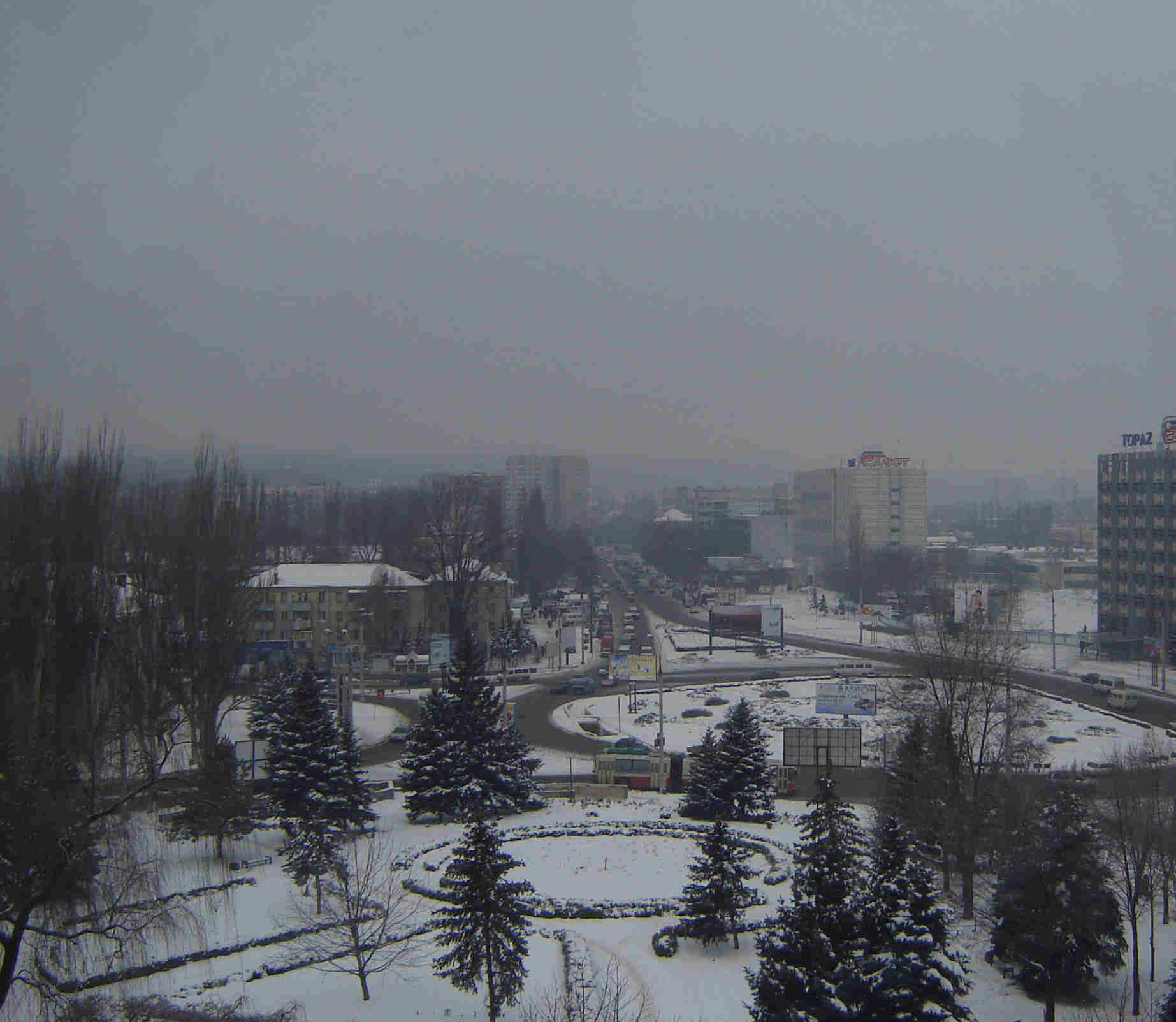 Another snowy Chisinau scene. This one was taken from the IREX Moldova headquarters where I was an interviewer for Moldovan students wanting to come to the U.S. on State Department sponsored scholarships.
15 February, Ambassador Heather Hodges had the Fulbright Scholars and students (as well as the folks that work with us in the Public Affairs section) to her house for dinner. Ambassador Hodges is in the center of the picture holding her dog, Rocky, who understands four languages!
After the Ambassador's dinner, I went to the ISPRI student association Valentine's Day disco. In this picture I am with my students, Victor and Silvia. |
![]()
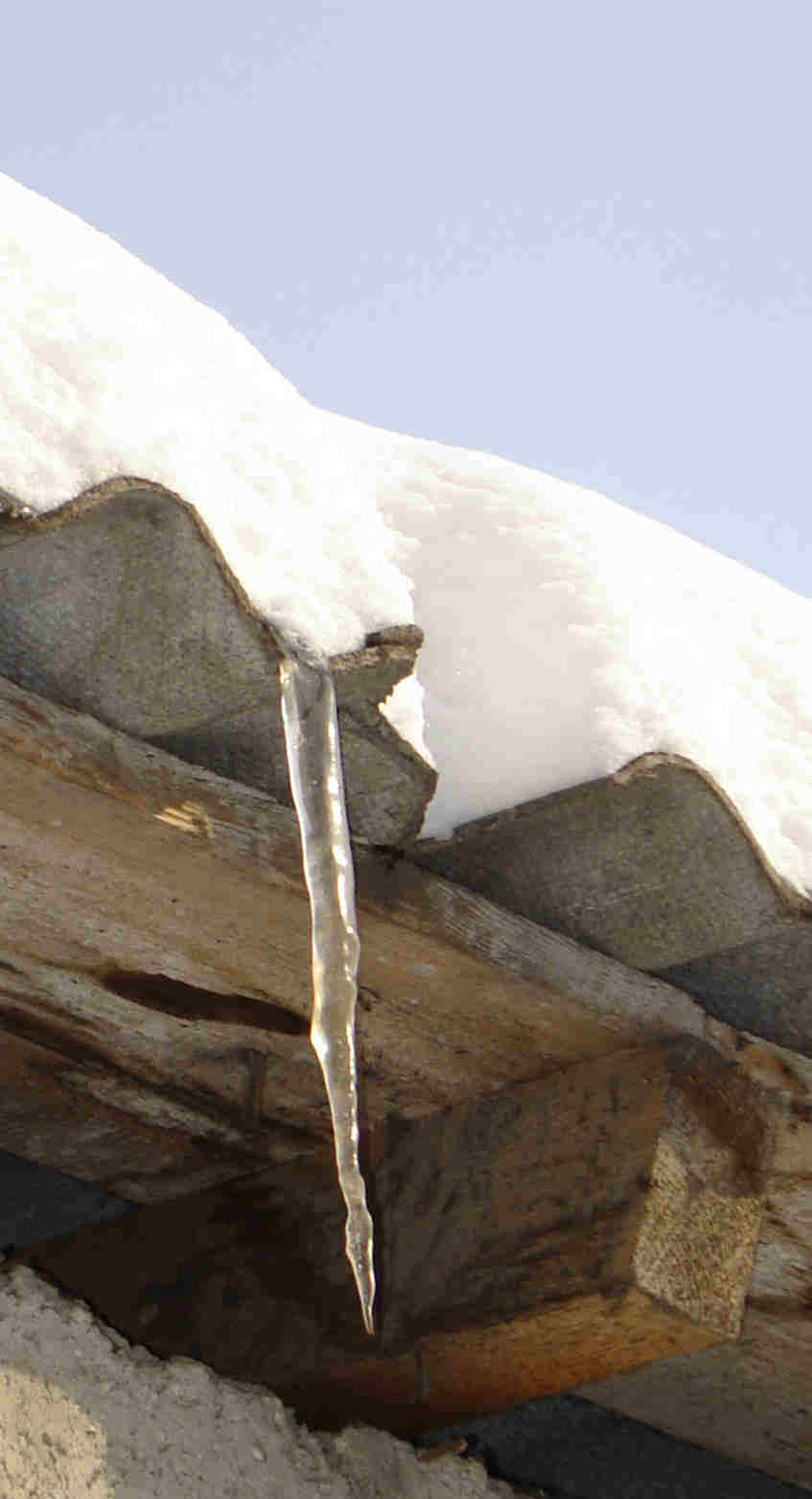
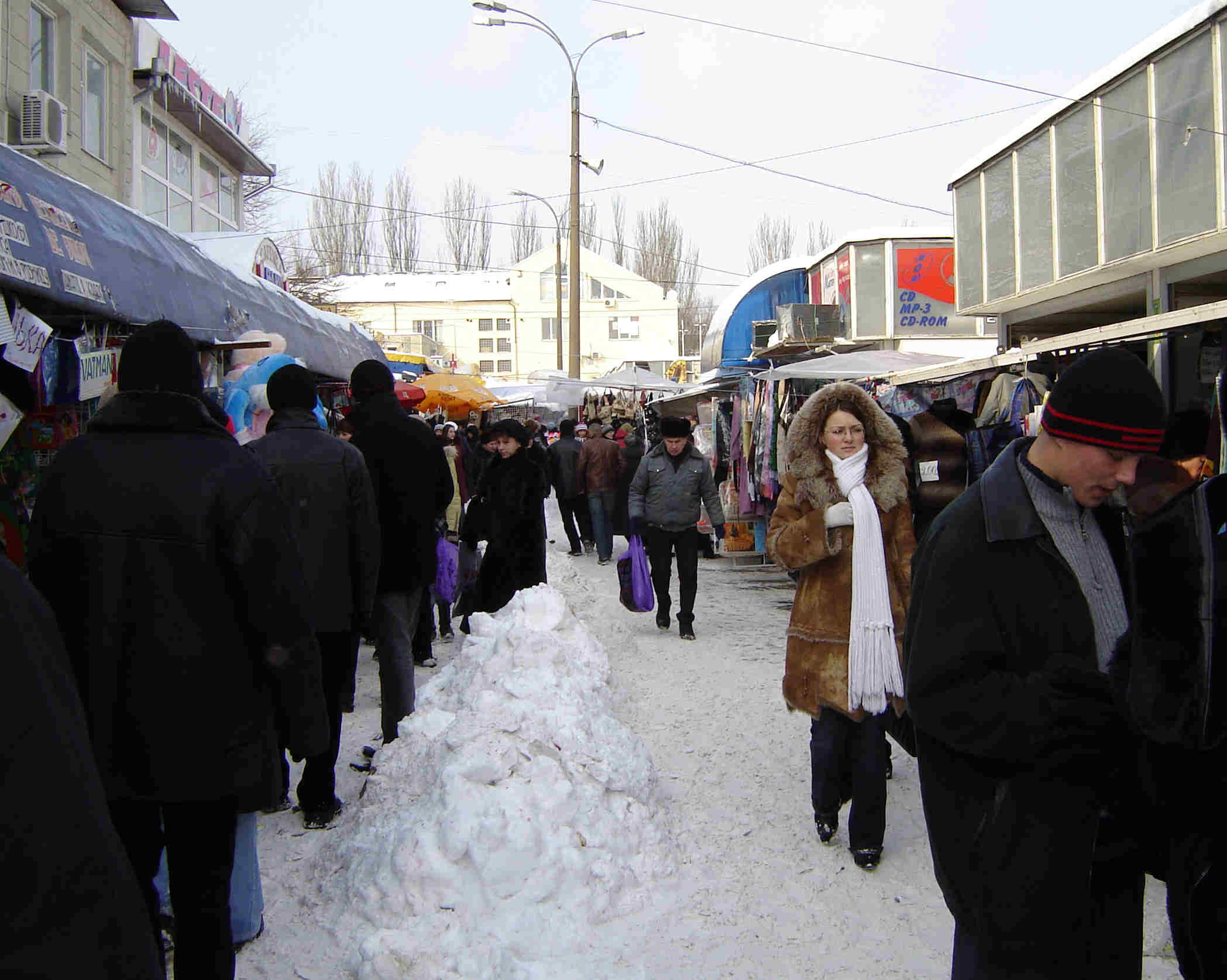 An icicle and a view of the Piata Centrale in Chisinau (the clothing lane to be precise...)
My street on Wednesday (no snow and today--lots of it)...
The flyer promises to teach me to speak English like an American in just one week, should I go? |
10 Feb...A visit to the Market and a lesson in customer
service Moldovan style...today I ran my big shopping errand to the
Piata Centrale (or central open-air market). I have been to a lot of
markets in my life in Bolivia, Peru, Mexico, Turkey...even India but the
market in Chisinau is a wholly different animal. First, they do very
little haggling here--prices are generally set. It makes it easier
and that part I like. Second, the market is organized into little
rows (or as I call them lanes) and on each row they are a series of stalls
selling similar items like cleaning supplies, clothing, vegetables, or
meat and fish (I avoid that area because although I am told the meat is
fresh and it certainly is kept chilled, the odor is overpowering).
So, anyway, my venture to the market today was for cleaning supplies--a mop, glass cleaner, bathroom cleaner--pretty simple stuff (you track a lot of grime in with the snow--oh, did I mention that we just had about six inches fall). So I went up and down the aisles until I found the places where the mops where and then I proceeded to look at one. This is my only complaint about the market--you look at a mop an the two women with NO other customers in their stall, ignore you. You ask "cit costa" how much, and they still ignore you, the mop falls and they look at you and shrug your shoulders. Needless to say, a frustrating experience and one repeated as I made my way to several stalls (well, only at the first did the mop actually fall). Finally, I came to a stall where the woman wanted to actually SELL her mop and I bought it happily. I wish I could say that this element of customer service was limited either to me or just to the market, but other Americans and even Moldovans have the same experience. And it is not just at the market. Even at the little supermarket up the block from me, I watched a Moldovan man basically "cuss-out" the cashier because she was so nasty to him--it did no good, she actually laughed at him. From my own experience, she is a nasty one and I always try to avoid her line. She rings up your groceries in a huge hurry throwing them in the bag as she goes (once she broke my eggs) and then demands your money immediately and hmms and sighs until you give it to her and then gets frustrated if it isn't exact change and rattles on at you--this is one time when language ignorance is bliss (but I am fluent in hmm-ing and sighing). I am grateful that there is a supermarket at all and I will say that in the upscale places like restaurants and finer retail establishments, generally, the service is as good as anywhere in the States. I don't know what exactly explains this way of doing things, other than it is a residual of the old Soviet way of doing things--clerks in the store had no reason to be proactive or friendly, they did you a service by letting you buy something (that is, if there were things to buy). It is certainly not the case that my contacts at the universities are aloof or distant, quite the contrary and my students are warm and friendly. I am reading some essays from students that are applying for scholarships to come to the states for a year and maybe there is some insight in them. All of them talk about how important friends and family are and that loyalty to them is the most important thing in their lives--maybe when I am at the market, I am not one of their own--so there is no loyalty...who knows, but there are days when I wish the market economy would open wider and bring about some understanding of what it means to get "repeat" customers. |
![]()
| 7 Feb...New look for the Quasi-Blog...in order to
greatly accelerate my ability to update the blog over the dial-up
connection I use here, I am separating the blog into several pages...this
month we are on a blue and gray format, which is appropriate because I am
trying to discuss the U.S. Civil War with my language and culture
students. This class which is taught for students learning English
is all young and female...but I chose things like the American Civil War,
the Athens music scene, Jazz, the civil rights movement and Hurricane
Katrina and its aftermath (including the snake infestation), and the death
penalty as topics for the class--they go over great when I teach frat boys
in Southern Politics, alas, young Moldovan women studying language have
different sensibilities. I know for many of you, its hard enough to
imagine my teaching any sort of language! I am practicing my
pronunciation and diction carefully--maybe I will get better.
Given that I chose "boy" topics for the class will make it a bit
tougher--so I am rethinking it. I am very grateful to all of you who
sent me literature to teach, that may work the trick! Anyone with
any other ideas (especially "girl" ideas), PLEASE send me them. The
class is called the American South: People and Culture. I will say
that the students in the class have great spoken English skills. My Political Science classes, on the other hand, seem to be going well and the students are laughing (mostly at times when I tell jokes). I find them bright and inquisitive and am enjoying interacting with them. I can hardly believe that one month ago right now, I was waking up and getting my things in order to leave. I have been in Chisinau for four weeks now and have a bit of a routine in place. To get to ISPRI, I have to take a Micro-Bus or "Marshooka" as they call them here (there are pictures to the left). They run set routes through the city and cost 2 lei (or 24 cents) to ride. These little buses are originally constructed to seat 12 people but they have been modified so that there is some "standing room." I counted 27 people on the one I rode back from school today! There must be a reward for which driver can drive the route the fastest, because they all drive incredibly fast--truly an adrenaline rush on the icy streets. That being said, I have been noticing more gray hair on my head, lately. All is well and more snow is expected over the weekend. |
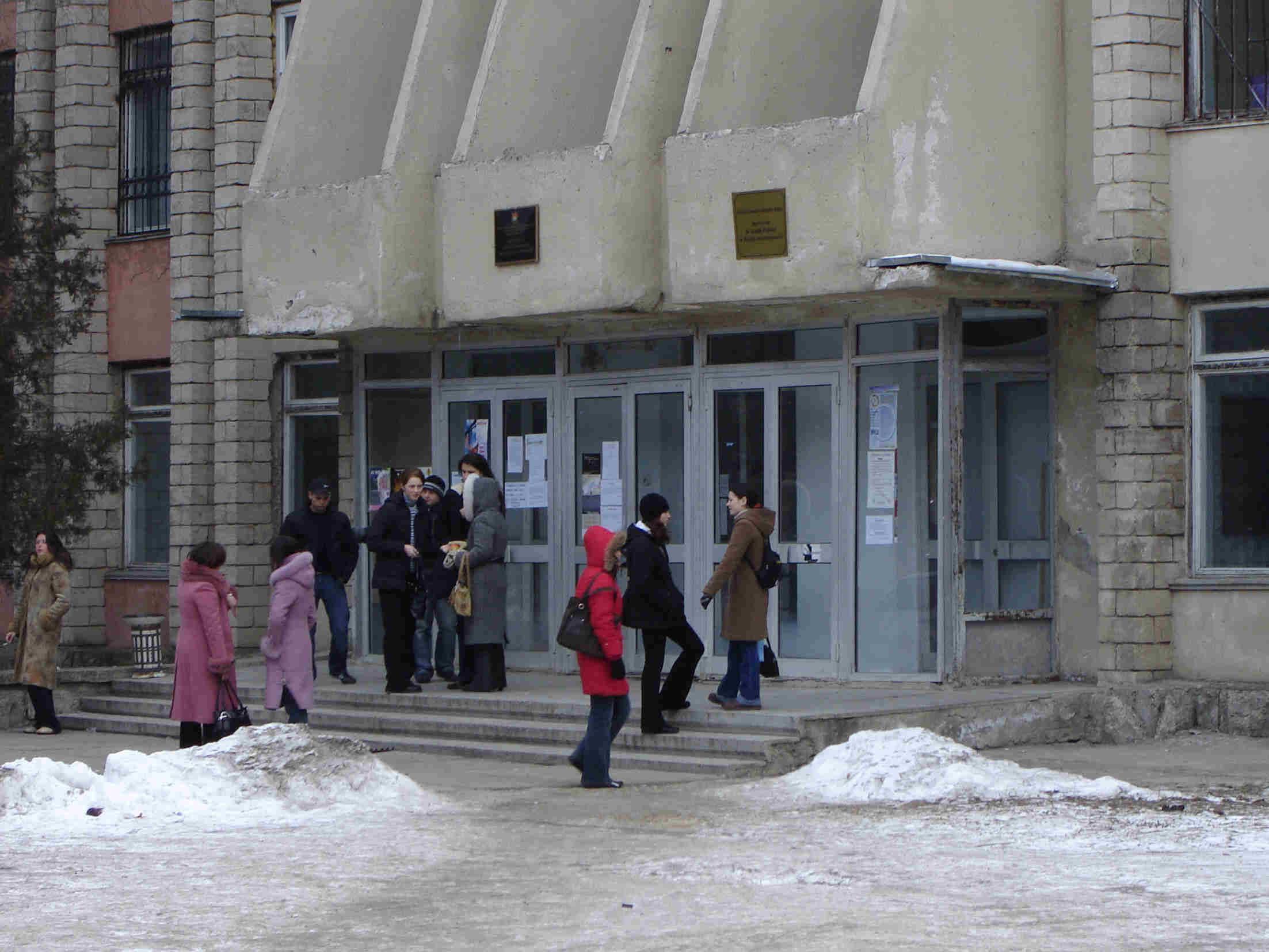 Students in between classes at ISPRI 7 February 2006.
Marshookas like the ones I ride to school on...
|
![]()
|
Stefan cel Mare is the patron saint of Moldova...the translation of Stefan cel Mare si Sfint (the name of my street) is something like...Stephen the greatest and a saint... |
E-mail me: chris_grant1234@yahoo.com or grant_jc@mercer.edu |
![]()
|
This page was first created on 09/19/05 by Prof. Chris Grant of Mercer University. Dr. Grant is an Assistant Professor in the Department of Political Science at Mercer University and is the Assistant Director of Service-Learning at the Mercer Center for Service-Learning and Community Development. The site was last updated on 05/03/06. You may e-mail Prof. Grant by clicking here or you may return to his homepage by clicking here. |